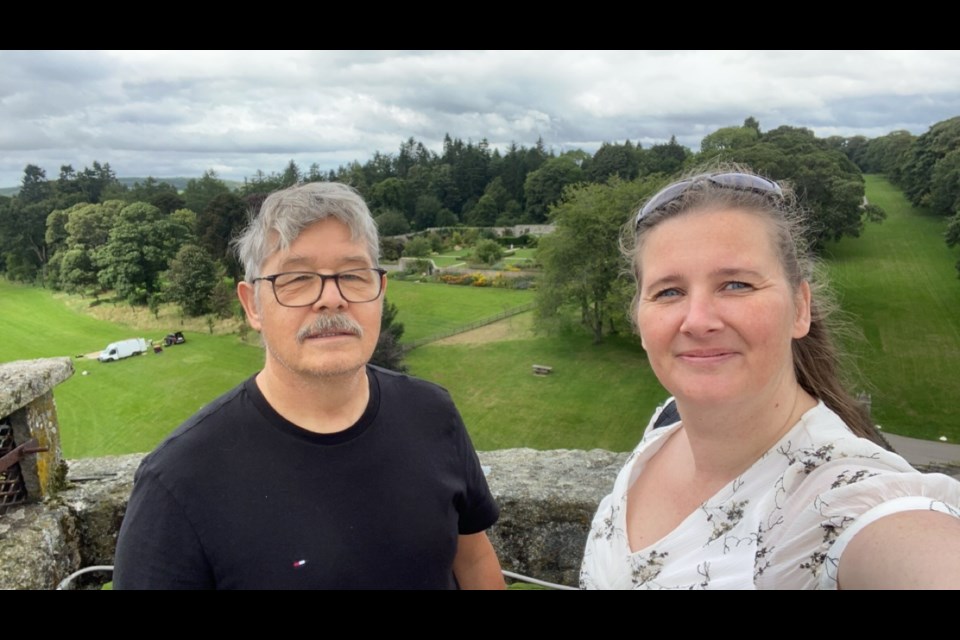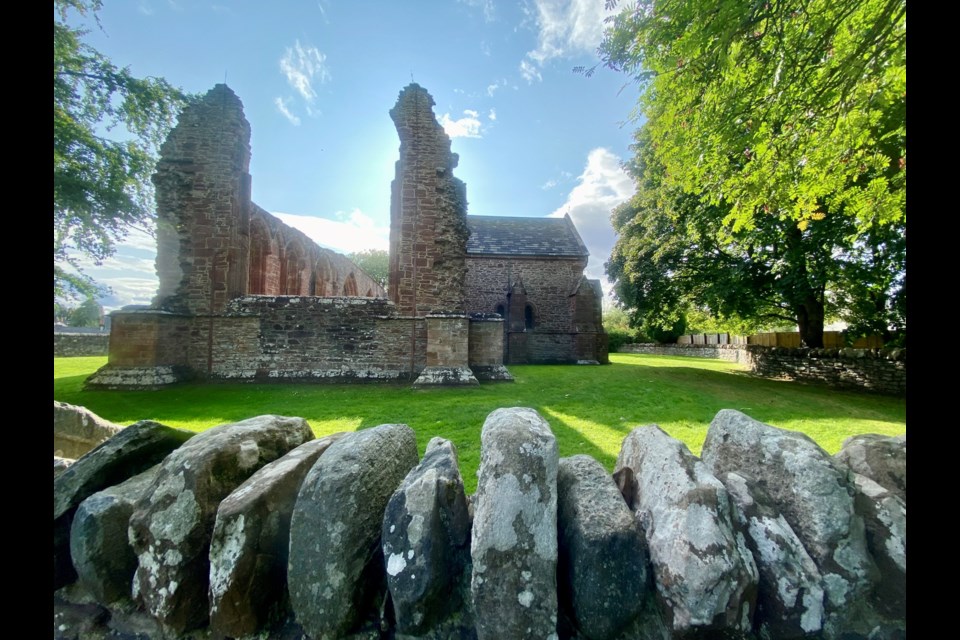YORKTON - It was a trip of a lifetime to explore family roots for Earl Fraser and his daughter Danielle.
The pair recently spent time in Scotland walking the same land the family originated on.
“Going on our trip to Scotland and exploring all the historic sights felt like opening a treasured photo album, flipping through the pages and immersing ourselves in the stories of our ancestors,” said Fraser. “From Scone Castle -- where all the Scottish Kings and Queen were Crowned. The Royal Mile Holyrood castle -- where Mary Queen of Scots was born, Edinburgh castle where the Scottish Military still has a stronghold, St Andrews Castle and University where Prince William graduated, and Kellie Castle, which was gifted to Robert de Brus’s daughter.
“Walking the halls of castles and the ground kings and queens graced for thousands of years, was enchanting.
“All had amazing history, but the best part was enjoying our time together, piecing together our ancestral heritage. It was like retracing the steps of our family’s past.
Fraser said the trip left a “mark on our hearts, reminding us of the importance of our heritage and the memories that will forever stay with us.”
The journey had commenced on Aug. 18.
“Arriving in Edinburgh by plane, we then embarked on a drive towards Aberdeen,” said Earl. “For someone accustomed to driving on the right side of the road, the experience of maneuvering on the left side was truly fascinating. However, it didn’t take us long to adapt to this new driving style, especially since we encountered five roundabouts before finally joining the M9 freeway leading to Aberdeen.”
Once the pair reached Aberdeen their true expedition commenced.
“Over the course of the next 10 days, we embarked on a remarkable journey, covering more than 3000 miles across the stunning landscaped of Scotland,” said Earl. “From the enchanting city of Inverness in the North, to the picturesque English border in the South, and from the captivating coastal towns of Aberdeen and Edinburgh on the East to the vibrant city of Glasgow on the West, we left no stone unturned in our exploration of Scotland.”
A highlight had to be a visit to a castle bearing the family name.
“History permeated our surroundings as we embarked on a journey to Castle Fraser, nestled near the coastal city of Aberdeen which is the oldest port city in Scotland,” said Earl.
“Originally constructed in the 15th century, this architectural marvel witnessed the passage of time and the unfolding of the countless tales.”
Fraser explained, in 1575 the z-plan castle build commenced by the 6th Laid of Fraser, Michael Fraser based on the earliest tower and the build was fully complete by 1636.
From 1575 until 1921, it served as the residence of the Fraser family.
Castle Fraser was handed down through all three lines of the Fraser’s. (Frasers of Muchall, Clan Fraser, and Clan Fraser of Lovat and lastly the Mackenzie Frasers).
“However, in 1921, the widow of Fredrick Mackenzie Fraser sold the castle due to the lack of a suitable heir and mounting financial difficulties,” said Earl. “The castle soon found itself under the new ownership of the First Viscount of Cowdray (Weetman Pearson) who’s lands neighboured the Fraser’s.”
With the exception of two wings, the castle has remained uninhabited since 1921.
In 1976, Mrs. Smiley donated the Castle, along with approximately 26 acres of its surrounding land to the National Trust of Scotland.
“During the castle’s restoration, a remarkable discovery occurred,” said Fraser. “Concealed within its ancient wall since the 17th century, a trove of priceless documents lay dormant. These invaluable records, dating back centuries, were generously entrusted to the University of Aberdeen. Today, they adorn the historical university archives, allowing curious minds to marvel at the insights into bygone eras that they offer.”
And, the trip was just beginning.
“Our journey from Castle Fraser led us to the charming town of Fraserburgh,” said Earl.
The town’s name, quite literally, translated to ‘Fraser’s burgh.’
“It was in the year 1504 when the Fraser family acquired the lands of Philorth,” said Earl. “As time went on, in 1570, the Fraser family constructed the magnificent Carinbulg Castle (Fraserburgh Castle). It was Alexander Fraser who, who in 1579, created the bustling port, that continues to thrive to this day.” Presently, Carinbulg castle stands as the residence of the esteemed 21st Lady Salton Marjorie Flora Fraser, from the noble Clan Fraser.
While in Northern Scotland near Inverness, nestled within the village of Beauly, stands the Beauly Priory built around 1230 for monks of the Valliscaulian order, a place that holds deep and timeless times with the esteemed Frasers of Lovat.
“Which in its hallowed grounds lie the resting places of numerous Fraser chiefs who lost their lives in many different battles such as the Battle of Blar na Leine,” said Earl. “Though now a mere ruin, this architectural marvel exudes an enchanting ambiance, saturated with the rich tapestry of Fraser history.
“We also had the opportunity to visit Moniack Castle, situated just south of Beauly. This magnificent fortress was constructed back in 1580 by the members of Clan Fraser. It holds a unique distinction as the sole castle that remains in the possession of the Lovat Frasers, the largest branch of the Clan.
“In a generous act of kinship, Simon Fraser, the 14th Lord Lovat, bestowed Moniack Castle as a gift to his elder brother in 1926 and to this day, the Castle is still inhabited by Lord Rory Fraser and his wife Lady Mary Fraser and their family.”
After all the hidden gems and history of the Frasers in the Highlands, the next area of interest started in Edinburgh and villages south and west toward Glasgow which is considered the Lowlands.
“The Lowlands are where the Fraser family originally immigrated to Scotland from France around 1060,” said Earl.
The Frasers were bestowed the nobility title of Sir during the reigns of William the Lion and Alexander II.
“While researching the lineage lines of the family we discovered that we are from the Gilbert Fraser Line,” explained Earl.
Gilbert was born in the little village of Peebles about 1195. He was the Sheriff of Tweeddale and was gifted Oliver Castle near Stirling, Scotland and is my 14th great-grandfather.
The sons that were to follow, followed in the footsteps of their fathers and became the Sheriffs of Tweeddale, Stirling, and many towns in-between, said Earl.
The land that was bestowed to the Fraser family was due to the connection with Robert de Brus (King Robert I) which was Alexander Fraser the grandson of Gilbert Fraser.
“As the years unfolded, our family branched out across the breathtaking landscapes of Scotland dispersing in various directions,” said Earl.
“It was amidst the exploration that we unearthed the precious thread connecting us to our direct line of ancestors.”
William Fraser, born in the year 1753, rests in the hallowed grounds of Thornhill Cemetery.
“He is my third great-grandfather,” explained Earl. “As we embarked on our walk around the cemetery, we regrettably found that through the passage of time the grave markers before 1850 were unreadable leaving to our imagination what my great-great-great-grandfathers gravestone looked like.”
The pair then ventured to the village of Closeburn, which Earl said was “a place steeped in history and hushed whispers of bygone years.
“We had the privilege of viewing the ruins of the church that my family attended in the late 1700s. My great-great-great grandfather Alexander Fraser was born on Sept. 3, 1797. He was baptized in the Closeburn Parish Church in December 1797.
“The echoes of his baptism lingered amidst the crumbling stones, evoking a profound sense of belonging within our hearts.”
It was at this stop a special moment occurred for the duo.
“An extraordinary occurrence unfolded within the sacred confines of grounds around the Thornhill Parish,” explained Earl. “After walking through the hallowed grounds, our departure was interrupted when my daughter inadvertently stepped on an object hidden in the grass near the front of the church.
“Intrigued, she retrieved the item, only to discover a solitary fragment of slate. Finding this piece of slate at the church was like stumbling upon a hidden treasure in an unexpected place.
“It was as if the universe had placed it there specifically for us to discover. Just as that piece of slate stood out among the soft grass, it stood as a symbol of our connection to the church and its history. It was a gentle reminder that sometimes, the most meaningful things in life come to us where we least expect them, like a precious souvenir from an unforgettable journey.”
The trip was something that in a way started some three decades earlier.
“In 1992, our daughter embarked on a tour and singing journey through Scotland, and I was meant to accompany her,” explained Fraser “Unfortunately, my diabetes posed a hurdle, preventing me from obtaining medical clearance to fly to Europe.
“Despite this setback, my daughter made sure to keep me informed about her adventures by calling frequently. I distinctly remember one particular phone call when she was in tears, unsure whether our family belonged to the Catholic or Protestant branch of the Fraser Clan. In those days, such distinctions held great significance.
“Through those heartfelt conversations, I found myself virtually touring Scotland, Wales, and England through my daughter's vivid descriptions. Each word painted a picture in my mind, and I held onto the hope that one day I would have the chance to experience it all firsthand.”
Then this summer the push to make a trip a reality came.
“Little did I know that July would bring an unexpected reminder from our family historian, Danielle,” said Fraser “She informed me that our family had now resided in Yorkton for a century.
“It was in July of 1923 when my grandfather, Archibald Fraser, was transferred from Broadview to Yorkton as the newly appointed Roadmaster for the Canadian Pacific Railway.”
But there remained the interest in where the Fraser clan came from.
“Thirty-one long years, since Danielle’s choir trip to Britain, my wife Gerry Ann surprised us both with tickets to fly to Edinburgh in mid-August,” said Earl. “It was finally happening - my long-awaited trip of a lifetime was about to unfold before my eyes.”
It was in some ways a trip to close a circle made through the decades.
“In 1905, my father Gordon was born, becoming the second generation of our family to be born on Canadian soil,” explained Earl.
His father, Archibald, was born in the small town of Renfrew, Ontario in 1867, “proudly standing as part of the inaugural generation born within the borders of Canada.
“Driven by our curiosity about our ancestral origins, my daughter and I embarked on a journey of our heritage. “Our search lead us back to the year 1829, when my great-grandfather Thomas was born in the quaint village of Thornhill, Scotland.
“Yet, our quest did not end there, as we traced our linage even further to my great-great-grandfather Alexander, born in 1797 in the picturesque hamlet of Closeburn, Scotland.”
It was in the year 1861 that Thomas, along with his family and parents, set sail to seek a new life in the promising lands of Canada.
“Inspired by the history of my great-grandfather and his forebears, a unanimous decision was made with my daughter to embark on a grand adventure to Scotland, with an insatiable curiosity to unravel the enigmatic tapestry of our heritage,” said Earl. “We set forth on our voyage, crossing the ocean to the very land that had shaped our ancestors.
“With each step on Scottish soil, we felt a deep connection to the generations who had come before us.
“Our goal was clear - to unravel the mysteries that lay shrouded in the mists of time and discover the profound truths of our lineage.”









